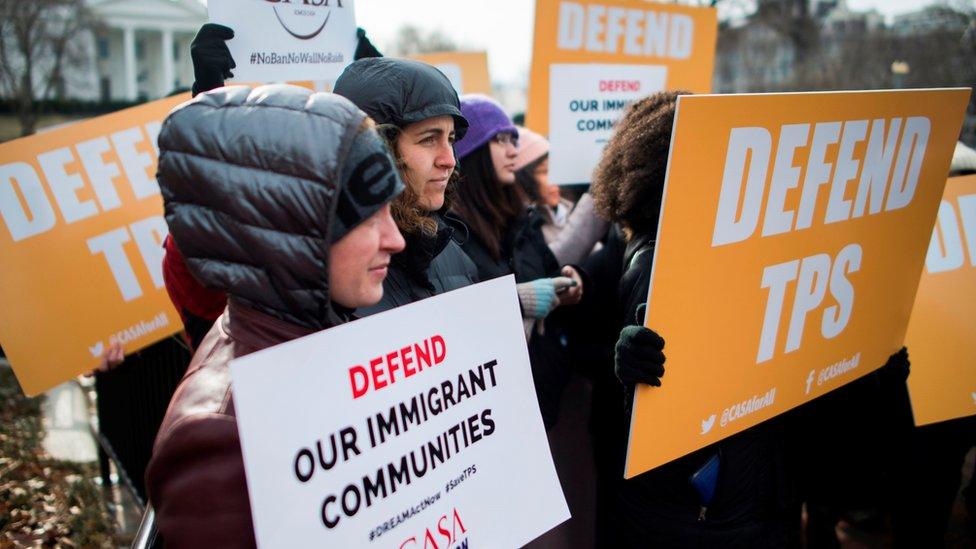El Salvador's shackled deportees become friends in adversity
- Published
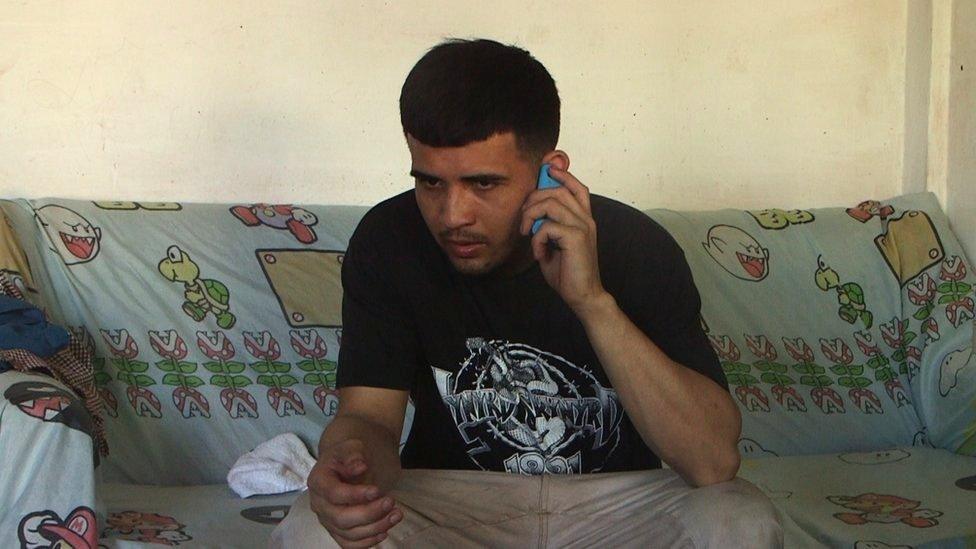
José Luis Canales did not know anyone in the country of his birth
It was not until the plane took off that José Luis Canales started to cry.
From the moment he was detained in Texas, he knew he was likely to be sent back to El Salvador, far from the life and family he had built in the United States over the past decade.
But none of it had seemed real until he was sitting in handcuffs on the flight from Houston to San Salvador alongside scores of other deportees.
Then the stark reality of his situation hit him and Mr Canales started to get desperate. "I'm on my own in this. I haven't got anyone," the 27-year-old recalls thinking at the time. "I had nowhere to go."
With no family waiting for him in the country of his birth, he turned to the fellow deportee he was shackled to, Miguel Ángel Canizales.
"He told me his story, that he was coming back to nothing and had no-one to support him back here," remembers Miguel Ángel, speaking just two weeks after the two men arrived back in San Salvador.
Miguel Ángel immediately opened his home and his family to the young stranger. "I told him: 'Look, I'll help you in whatever I can. Don't worry, somehow we'll get by'."
Surviving
Getting by is what they have been doing ever since.
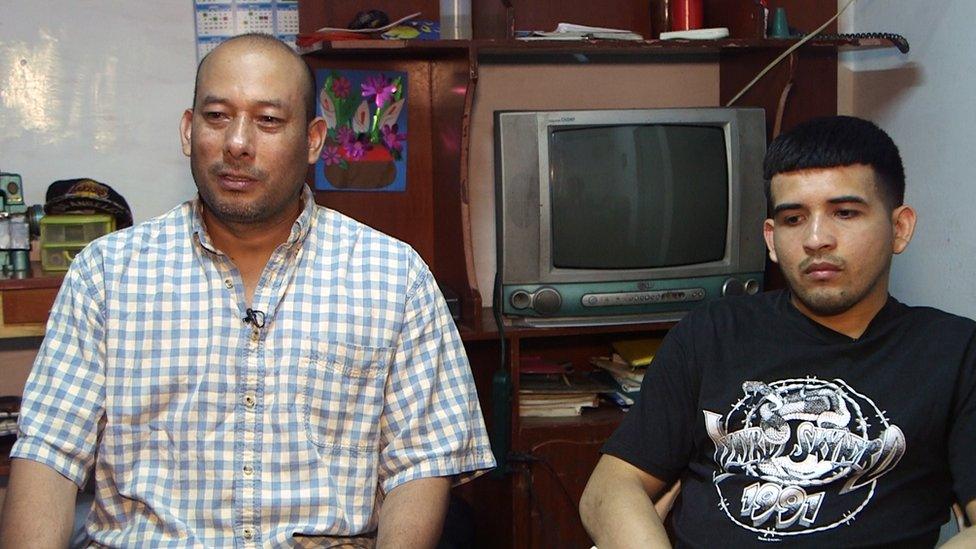
Miguel Ángel (L) and José Luis became friends after they were shackled together on the plane
Miguel Ángel's family found a bed and some spare clothes for José and stretched what little they had to feed one more mouth.
"I was a bit worried about what my sisters might say when I brought home someone they didn't know," admits Miguel Ángel.
But his family share his deep-seated Christian beliefs and saw it as their duty to help José.
José and Miguel Ángel's plight is common in El Salvador: 26,000 deportees from the US and Mexico returned to the Central American country last year.
Whether returning with family or alone, they all pass through the Chacra processing centre in the capital.
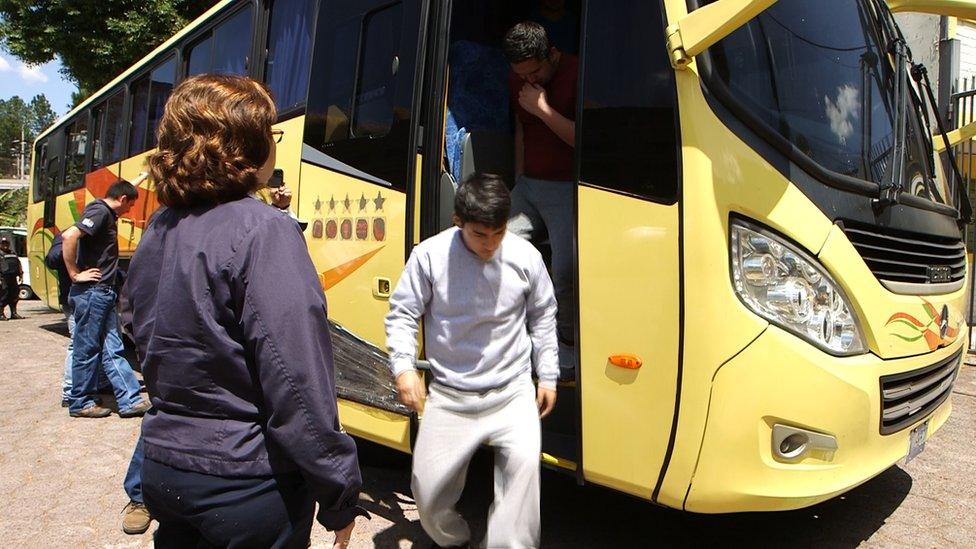
Daily buses loaded with Salvadoreans deported from the US arrive
Blinking into the sun as they disembarked, a steady stream of people, from babies to grandparents, stepped off three immigration service buses on the day we were there.
"There were six here yesterday," one of the police officers tells me.
Where is 'home'?
While the returnees have no laces in their shoes and many are still wearing the grey tracksuits issued by US detention centres, they are greeted with some kindness in El Salvador. They are offered coffee and a meal, the chance to call family and get medical attention.
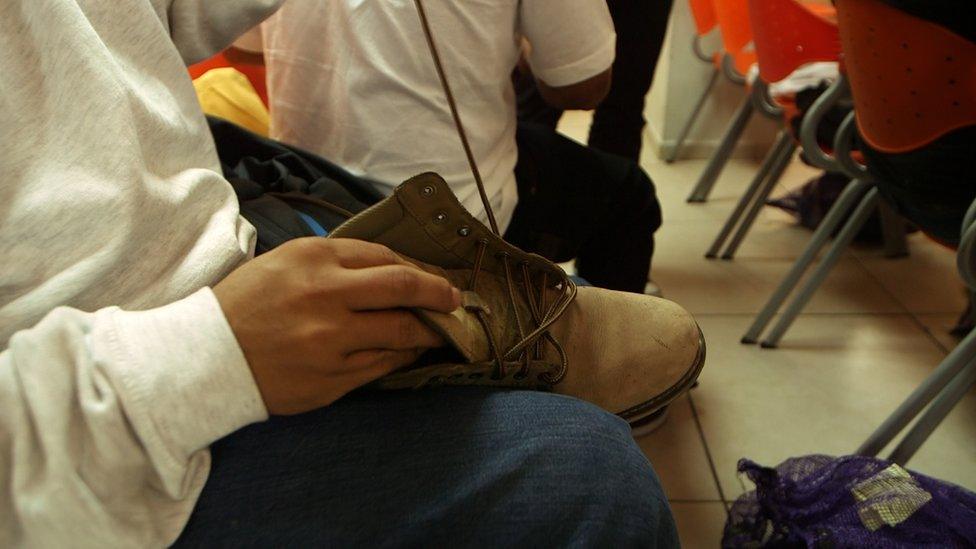
Deportees thread the laces back into their shoes after arriving in El Salvador
The Trump administration says it has sent these deportees home. For many, though, "home" was the United States.
William certainly feels that way. He was taken to the US by his parents as a child and lived there for 40 years.
"It's real strange for me to come back to the place where I was born because actually I've hardly lived here," he says.
Aware of the stigma attached to deportees, he asked that we only use his first name and says it is a real struggle to find decent work.
"Ain't nobody wants to work for $10 (£7) a day," he says with a Californian drawl. "At the call centres, they pay between $30 and $35 a day. So what I'm thinking is to take advantage of what I'm good at and that's speaking English."
Having worked as an instructor in the United States, his aim is to open up an English academy to prepare people to work in the call centres.
There is a government scheme offering deportees with entrepreneurial spirit a little seed money to establish such companies. But securing funding is not easy, says William.
Deaf ears
Politicians know that the outlook for deportees is far from bright and that more needs to be done to prevent the exodus to the United States in the first place.
But calls to the Trump administration to work together on the issue are falling on deaf ears, says Johnny Wright, a lawmaker in the Salvadoran parliament.
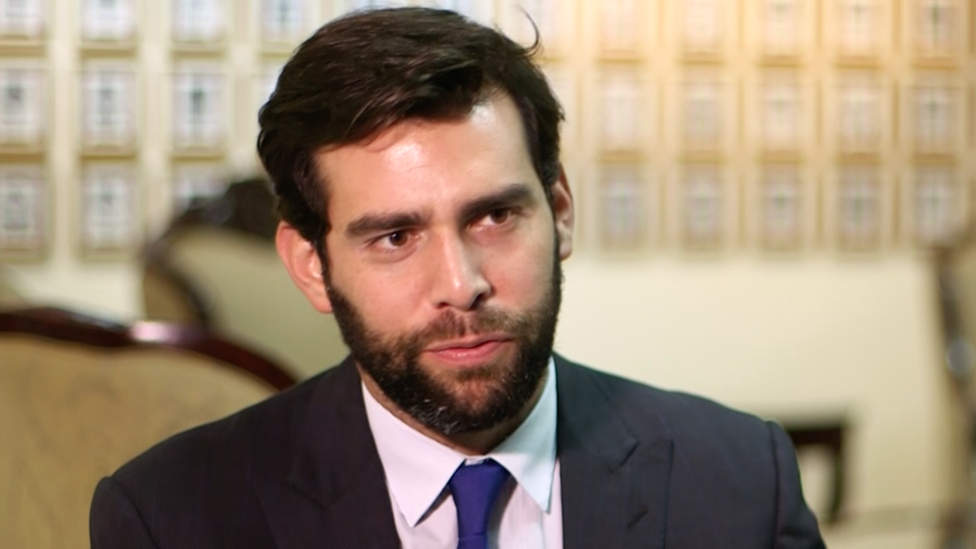
Johnny Wright is a member of the conservative Arena party in El Salvador
He argues that the problem is that the White House solely thinks about immigration in terms of security.
"If you remove the humane or humanity component, then you're not necessarily talking about human lives which are at stake, or family reunification or any of these principles which are the glue that has held the current policy in place."
Despite urging a more compassionate approach, Mr Wright is no liberal. A member of El Salvador's conservative Arena party, which is a close ally of Washington in Central America, he also wants the White House to change its language on immigrants, especially following President Donald Trump's recent crude description of El Salvador as a "shithole country".
"When you have that kind of discourse, you reinforce stereotypes and division. It's essentially the politics of fear," says Mr Wright.
For José and Miguel Ángel, one of their biggest fears - unemployment - has been allayed. They found some manual labour through the Church, building bleachers around a sports field in a poor neighbourhood of the capital.
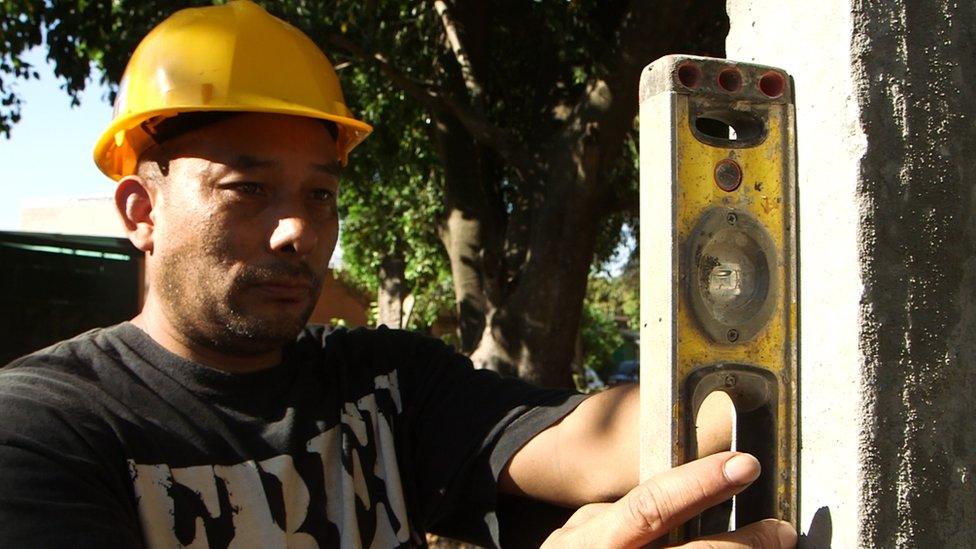
Miguel Ángel and José have found work in construction
"My original plan was to try to reach the US again, through Guatemala and Mexico," " says José, wiping the sweat from his forehead,
It was Miguel Ángel who dissuaded him, insisting he was safer in El Salvador.
They may have been strangers when they were first chained to each other.
Now it seems neither man is quite ready to leave the other's side.
- Published12 January 2018
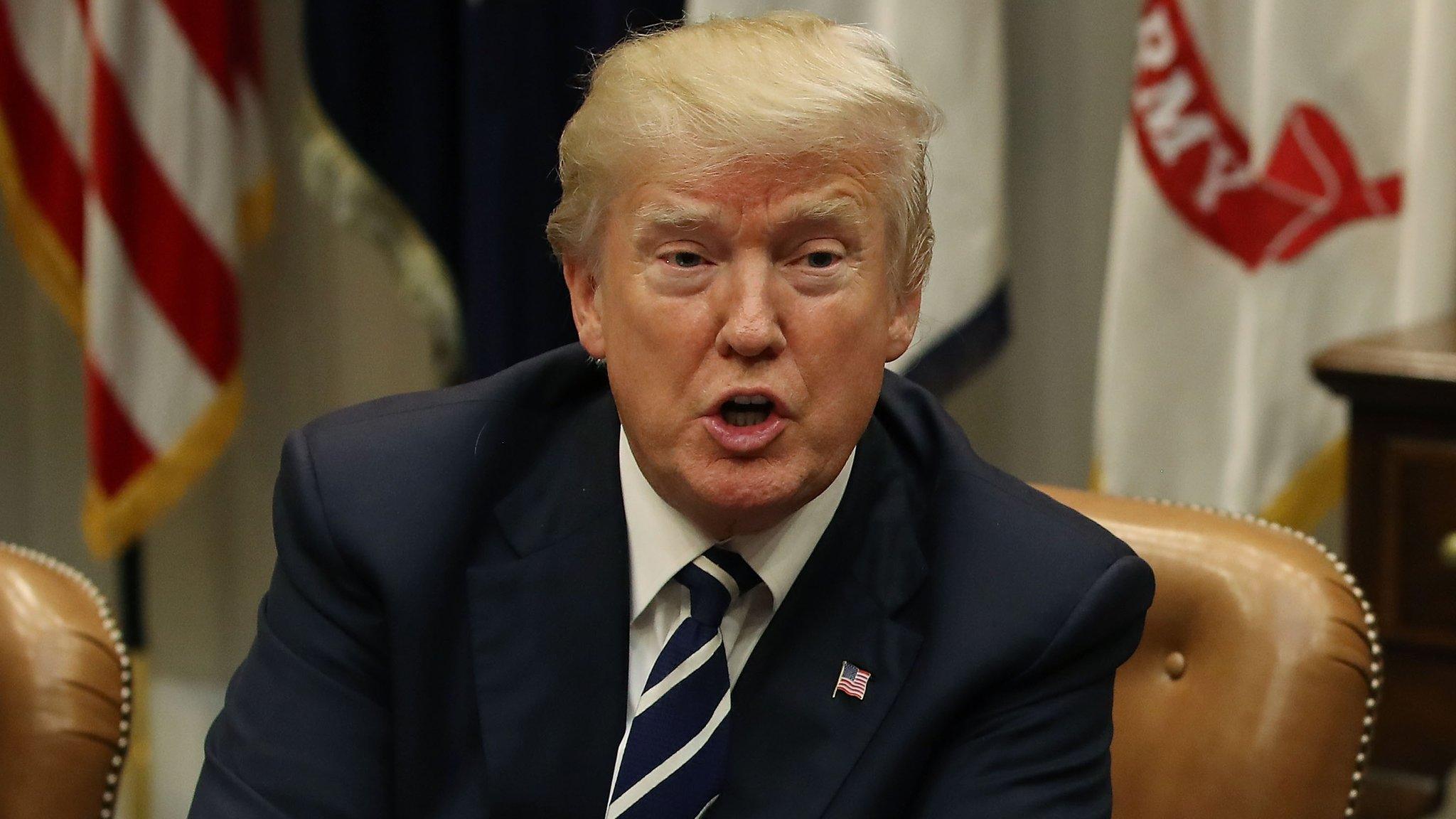
- Published12 January 2018

- Published9 January 2018
